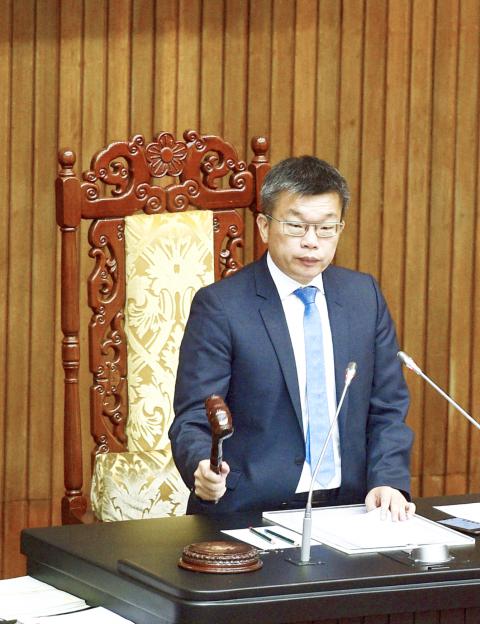Lawmakers yesterday passed the Special Act on the Procurement of Updated Fighter Jets (新式戰機採購特別條例), which caps the budget for the purchase of 66 F-16Vs at NT$250 billion (US$8.19 billion).
The act aims to respond to enemy threats and urgent national defense needs by gradually acquiring updated high-performance jets, to strengthen the air force’s combat abilities, improve the nation’s preparedness for joint operations, and ensure national and regional security, the act states.
It also seeks to enable the nation to attain autonomy regarding defense and drive domestic economic growth, it says.

Photo: Peter Lo, Taipei Times
The procurement plan covers the acquisition of the jets and their equipment, as well as the acquisition, maintenance, development and manufacture of ancillary systems, the act says.
The cost is to be covered by a special budget of up to NT$250 billion, which would come from loans and surplus revenue from the previous fiscal year, it says.
The budget may be tapped to cover the central government’s running expenses, the act says.
If the expenditure exceeds the approved budget due to currency fluctuations, an item should be proposed in the general budget to cover the shortfall, it says.
The act has a Dec. 31, 2026, deadline.
Also passed were supplementary resolutions sponsored by the Chinese Nationalist Party (KMT), the New Power Party (NPP) and the People First Party (PFP).
The KMT’s motion says that as the National Defense Industry Development Act (國防產業發展條例) was passed in June, the Ministry of National Defense should ask the US to transfer technologies used to make F-16V parts and components, and lobby for US approval to allow Taiwan to manufacture key F-16V components.
The nation should also establish an “F-16 Asian maintenance center” after the jets have been delivered, it says.
The NPP’s motion says the ministry should report annually to the legislature’s Foreign Affairs and National Defense Committee about the delivery progress of the jets, technological collaborations with the US and logistics to receive the jets.
The PFP’s motion says the government should ask the foreign manufacturer of the jets — Lockheed Martin Corp — to invest in industrial collaborations with Taiwan, including component manufacturing, technological transfers and industrial upgrade initiatives.
The defense ministry and the Ministry of Economic Affairs should work together to secure private-sector resources for the national defense industry, the motion says.
The F-16Vs are expected to be deployed at Chihhang Air Base (志航空軍基地) in Taitung County, while the air force plans to set up a combat squad of up to 1,000 personnel, military sources said.
Minister of National Defense Yen De-fa (嚴德發) said that the nation should receive the first batch of F-16Vs in 2023 and all 66 jets before the end of 2026.
Additional reporting by CNA

The CIA has a message for Chinese government officials worried about their place in Chinese President Xi Jinping’s (習近平) government: Come work with us. The agency released two Mandarin-language videos on social media on Thursday inviting disgruntled officials to contact the CIA. The recruitment videos posted on YouTube and X racked up more than 5 million views combined in their first day. The outreach comes as CIA Director John Ratcliffe has vowed to boost the agency’s use of intelligence from human sources and its focus on China, which has recently targeted US officials with its own espionage operations. The videos are “aimed at

STEADFAST FRIEND: The bills encourage increased Taiwan-US engagement and address China’s distortion of UN Resolution 2758 to isolate Taiwan internationally The Presidential Office yesterday thanked the US House of Representatives for unanimously passing two Taiwan-related bills highlighting its solid support for Taiwan’s democracy and global participation, and for deepening bilateral relations. One of the bills, the Taiwan Assurance Implementation Act, requires the US Department of State to periodically review its guidelines for engagement with Taiwan, and report to the US Congress on the guidelines and plans to lift self-imposed limitations on US-Taiwan engagement. The other bill is the Taiwan International Solidarity Act, which clarifies that UN Resolution 2758 does not address the issue of the representation of Taiwan or its people in

US Indo-Pacific Commander Admiral Samuel Paparo on Friday expressed concern over the rate at which China is diversifying its military exercises, the Financial Times (FT) reported on Saturday. “The rates of change on the depth and breadth of their exercises is the one non-linear effect that I’ve seen in the last year that wakes me up at night or keeps me up at night,” Paparo was quoted by FT as saying while attending the annual Sedona Forum at the McCain Institute in Arizona. Paparo also expressed concern over the speed with which China was expanding its military. While the US

SHIFT: Taiwan’s better-than-expected first-quarter GDP and signs of weakness in the US have driven global capital back to emerging markets, the central bank head said The central bank yesterday blamed market speculation for the steep rise in the local currency, and urged exporters and financial institutions to stay calm and stop panic sell-offs to avoid hurting their own profitability. The nation’s top monetary policymaker said that it would step in, if necessary, to maintain order and stability in the foreign exchange market. The remarks came as the NT dollar yesterday closed up NT$0.919 to NT$30.145 against the US dollar in Taipei trading, after rising as high as NT$29.59 in intraday trading. The local currency has surged 5.85 percent against the greenback over the past two sessions, central